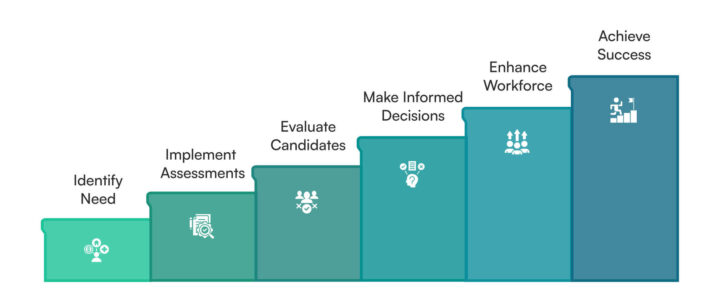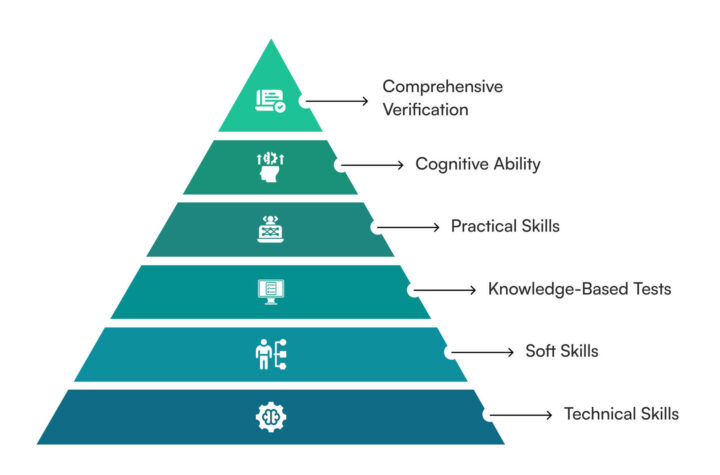Employment screening solutions have become indispensable tools for modern businesses seeking to build high-performing teams. These solutions enable organizations to make data-driven hiring decisions through meticulous evaluation of candidates’ skills, knowledge, and qualifications. For business owners and HR professionals, implementing robust pre-employment screening practices is not just about avoiding hiring mistakes; it’s about actively cultivating teams that drive innovation, productivity, and overall organizational success.
In recent years, the employment sphere has undergone significant changes: remote work, rapidly changing skill requirements and increased attention to adaptability have emerged. As a result, the ability to accurately assess a candidate’s abilities through reference checks during the hiring process has become more important than ever. Traditional hiring methods often fail to predict performance, resulting in costly hiring mistakes and reduced team effectiveness.
By utilizing comprehensive employment background screening processes, companies can:
- significantly reduce the risk of hiring underqualified candidates;
- streamline the onboarding process by identifying skill gaps early;
- improve team dynamics by ensuring new hires have the necessary technical and soft skills;
- enhance overall company performance through a more skilled and capable workforce;
- stay competitive in rapidly evolving industries by consistently bringing in top talent.
The following sections will delve deep into the various aspects of pre-employment background screening, focusing on skills and knowledge verification. We’ll explore the different types of assessments, their implementation strategies, and the tangible benefits they bring to organizations of all sizes.

Pre-Employment Skills and Knowledge Check Solutions
Pre-employment background checks form the cornerstone of effective hiring strategies. These comprehensive evaluations provide a multi-faceted view of potential employees’ capabilities, allowing employers to make informed decisions that go beyond the limitations of resumes and interviews. Let’s explore each component in detail:
- Technical skills assessment
Background checks for hiring IT specialists often include technical skills assessments designed to evaluate a candidate’s proficiency in specific tools, technologies, or methodologies relevant to the job role. These assessments can include:
- Customized coding tests for software developers. These tests evaluate a candidate’s ability to write clean, efficient code in specific programming languages. They often include problem-solving exercises, debugging tasks, and code optimization challenges. For example, a test for a Java developer might include tasks like implementing a specific algorithm, designing a class structure, or optimizing database queries.
- CAD proficiency evaluations for engineers. These assessments measure a candidate’s ability to use Computer-Aided Design (CAD) software effectively. Tasks might include creating 3D models, generating technical drawings, or troubleshooting design issues. The complexity can range from basic part modeling to advanced assembly design and simulation.
- Data analysis challenges for business analysts. These tests evaluate a candidate’s ability to work with data, derive insights, and present findings. Tasks could include cleaning and preprocessing data sets, performing statistical analyses, creating visualizations, and interpreting results. Candidates might be asked to use tools like Excel, SQL, or more advanced platforms like Python or R, depending on the role requirements.
Wee’ve started using LLM models and artificial intelligence more frequently to test candidates’ technical skills! This has allowed us to increase productivity by 18%, which is dozens of hours of work.

- Soft skills evaluation
Soft skills are critical for workplace success, often determining how well an employee can work within a team, communicate ideas, and adapt to changing situations. Evaluations in this area include:
- Situational judgment tests. These tests present candidates with realistic workplace scenarios and ask them to choose the most appropriate response. They assess decision-making skills, problem-solving abilities, and alignment with company values. For example, a scenario might involve resolving a conflict between team members or handling a difficult client situation.
- Communication style assessments. These evaluations gauge a candidate’s ability to convey ideas clearly and effectively in various contexts. They might assess written communication through email writing tasks, verbal communication through simulated presentations, and listening skills through comprehension exercises.
- Team collaboration simulations. These assessments evaluate how well candidates work in group settings. They might involve online role-playing exercises where candidates must work together to solve a problem or complete a project. These simulations can reveal leadership potential, adaptability, and the ability to contribute effectively in a team environment.
Our employee background screening services
allow you to assess candidates quickly and efficiently.
- Knowledge-based tests
These tests evaluate a candidate’s understanding of industry-specific concepts, regulations, or best practices. They are particularly useful for roles that require specialized knowledge. Examples include:
- Industry-specific quizzes.These assessments cover key concepts, terminologies, and current trends in a particular industry. For instance, a marketing professional might be tested on their understanding of digital marketing channels, SEO principles, or consumer behavior theories.
- Product knowledge assessments for sales roles. These tests evaluate a candidate’s ability to understand and articulate product features, benefits, and unique selling points. They might include questions about product specifications, use cases, and competitor comparisons.
- Regulatory compliance tests for financial positions. These assessments ensure candidates are well-versed in relevant financial regulations and compliance requirements. Topics might include anti-money laundering laws, securities regulations, or accounting standards, depending on the specific role and jurisdiction.
- Language proficiency
For roles requiring multilingual skills or those in international businesses, language proficiency assessments are crucial. These can include:
- Written and verbal communication tests. These assess a candidate’s ability to understand, write, and speak a language effectively. They might include reading comprehension exercises, essay writing tasks, and oral interviews.
- Translation exercises for multilingual roles. These evaluate a candidate’s ability to accurately translate content between languages, preserving both meaning and context. Tasks might involve translating technical documents, marketing materials, or customer communications.
- Industry-specific terminology assessments. These tests focus on specialized vocabulary relevant to particular industries or roles. For example, a medical translator might be tested on their knowledge of anatomical terms or pharmaceutical nomenclature.
- Problem-solving and critical thinking
These assessments evaluate a candidate’s ability to analyze complex situations, think critically, and develop effective solutions. They can include:
- Case study analyses. Candidates are presented with detailed business scenarios and asked to analyze the situation, identify key issues, and propose solutions. This tests their ability to apply theoretical knowledge to practical problems.
- Logic and reasoning tests. These assessments include puzzles, pattern recognition tasks, and logical reasoning questions. They evaluate a candidate’s ability to think systematically and draw valid conclusions from given information.
- Strategic thinking scenarios. These tests present candidates with complex, long-term business challenges and ask them to develop strategic plans. This assesses their ability to think ahead, consider multiple factors, and make decisions with long-term implications.
- Practical skills demonstrations
These assessments go beyond theoretical knowledge to evaluate how candidates apply their skills in realistic work scenarios. They can include:
- Job simulations. These are detailed recreations of job tasks or environments. For example, a customer service representative might handle simulated customer calls, or a project manager might be asked to plan and execute a mock project.
- Work sample tests. Candidates are asked to complete a task that closely resembles what they would do in the actual job. This could be writing a piece of code, creating a marketing plan, or designing a product prototype.
- Portfolio reviews. For creative or technical roles, a thorough review of a candidate’s past work can provide insights into their skills, style, and experience. This might involve discussing specific projects, understanding their role in each, and evaluating the quality of the work.
- Cognitive ability tests
These assessments evaluate a candidate’s mental capabilities that are relevant to job performance. They typically include:
- Numerical reasoning. These tests assess the ability to interpret numerical data, understand statistical information, and make calculations. They’re particularly relevant for roles involving data analysis or financial management.
- Verbal comprehension. These evaluate a candidate’s ability to understand and interpret written information, which is crucial for roles requiring extensive reading or writing.
- Abstract thinking. These tests assess the ability to identify patterns, think creatively, and solve novel problems. They’re often used to gauge a candidate’s potential to learn and adapt in complex environments.

By implementing a comprehensive mix of these assessment types, organizations can gain a holistic view of each candidate’s capabilities. This multi-faceted approach to skills and knowledge verification allows for more informed hiring decisions, ultimately leading to a more capable and effective workforce.
We audit our internal processes on a regular basis and analyze the quality of our hiring practices to ensure compliance with ISO 9001 standards. If we identify areas for improvement, we implement changes. This is an ongoing process

Importance of Comprehensive Skills and Knowledge Verification
Comprehensive employment background screening in hiring is crucial in today’s competitive business landscape. Accurate assessment of candidates’ capabilities is key to building high-performing teams. This article explores the benefits of robust pre-employment verification checks, showing their impact on organizational success, efficiency, and growth.
Thorough skills verification leads to increased productivity, reduced turnover, improved team dynamics, and enhanced customer service. For example, a technology firm reported new hires passing enhanced skills assessments were 40% more likely to exceed first-year performance expectations.
Skills verification enables faster onboarding, improved problem-solving, enhanced innovation, and stronger adaptability to market changes. A manufacturing company implementing rigorous technical skills assessments reduced production errors by 28% within six months, securing premium client contracts.
Comprehensive skills verification reduces skill-based errors, lowers training costs, minimizes project delays, and improves resource allocation. An IT services provider reported a 35% decrease in project overruns after implementing comprehensive technical assessments.
Skills-based hiring reduces unconscious bias, enables data-driven candidate comparison, ensures consistent evaluation criteria, and improves workforce diversity. A financial services firm achieved a 22% increase in workforce diversity while maintaining high performance standards through skills-based hiring.
Skills verification demonstrates due diligence, provides verifiable proof of employee competencies, aligns with industry certifications, and reduces negligent hiring risks. A healthcare provider avoided penalties and improved patient care quality metrics by 18% through rigorous knowledge tests.
Companies known for thorough skills verification processes gain recognition as employers of highly skilled professionals, improve client trust, attract top talent, and reduce reputational risks. A consulting firm’s client satisfaction scores increased by 18% after implementing comprehensive skills verifications.
Skills verification processes enable targeted training, data-driven career progression, improved succession planning, and enhanced employee engagement. A retail company reduced management training costs by 25% and saw 30% more internal promotions to management positions within two years of implementation.
Skills and knowledge verification in hiring is a strategic necessity for thriving businesses. Objective, skills-based assessments build capable, diverse, and engaged workforces while reducing risks and enhancing reputation. Benefits extend beyond hiring, influencing operations, strategic planning, and workforce development. Organizations prioritizing thorough skills verification are better positioned to attract talent, drive innovation, and maintain competitiveness. Investing in comprehensive skills verification ensures future success and sustainability.
Conclusion
Employment screening solutions focused on skills and knowledge verification serve as critical tools for building robust, high-performing workforces. These comprehensive pre-employment background verification processes enable informed hiring decisions, mitigate various risks, and foster productive work environments that drive organizational success.




